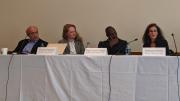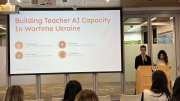Reed Hundt, the former chairman of the United States Federal Communications Commission and current chairman of Making Every Vote Count, jokes that he has a unique boast. He went to high school and law school with the only two people alive today who won the popular vote for U.S. president, but didn't end up getting the job: Al Gore and Hillary Clinton. The reason? The Electoral College, the idiosyncratic presidential election process enshrined in Article II, Section 1 of the U.S. Constitution.
Hundt was one of the more than 20 speakers at “The Electoral College: Open Questions, Paths Forward” conference at Harvard Law School (HLS) this Saturday, organized by professor Lawrence Lessig and the Harvard Law & Policy Review. Lessig, founder of Equal Citizens and Equal Votes, was a candidate for the Democratic party’s nominee for President in 2016, running on a platform of electoral reform. The mismatched popular vote and Electoral College results of that election saw Donald Trump elected as President, despite Hillary Clinton receiving nearly 3 million more votes. Trump’s ascendency has brought the skewed design of the Electoral College under more scrutiny, reignited interest in electoral reform, and added fuel to Lessig’s argument.
Through the Electoral College, voters do not vote for a presidential candidate directly. They vote indirectly, through a group of 538 Electors. Each state gets between 3-55 Electoral votes, equal to their number of congressional representatives. And each state’s electors (usually) cast all of that state’s electoral votes for the state’s first-past-the-post candidate. So, if a Democrat wins California by even a small margin, all 55 of California’s electoral votes would be blue. This counting system gives disproportionate political power to small states and to closely contested purple states that can end up swinging an election.
The parentheses buried in the paragraph above are important. State electors (usually) cast all their state’s electoral votes for that state’s first-past-the-post candidate. It’s expected that Electors will cast all of their votes in line with the state’s popular vote. (With the exception of Maine and Nebraska, which have introduced district-level electoral votes to divvy their votes proportionally between candidates.) But Electors haven't always met this expectation. Sometimes electors vote their conscience, irrespective of their state’s popular vote. These rogue voters are dubbed “faithless electors.”
But they mightn't be faithless at all.
Lessig’s Equal Votes group is taking a “faithless elector” case to the Supreme Court. The case focuses on the faithless Colorado elector Micheal Baca, and subsequent 10th circuit opinion finding that states cannot control how presidential electors vote. Baca voted his conscience for John Kasich, instead of abiding by Colorado state law that would have compelled him to vote for Hillary Clinton.
Critical decision in the 10th circuit, with an extraordinary opinion finding states cannot control how presidential electors vote. This issue (via a parallel Washington State case) is on its way to #SCOTUS. https://t.co/27xdl608ZM
— Lessig (@lessig) August 20, 2019
Lessig hopes the legal arguments he presents to the Supreme Court will result in a ruling in favor of Electors’ right to vote their conscience. He hopes this kind of originalist reading of the Constitution would spark public outrage and push electoral reform, because it doesn't jibe with most Americans' views on what modern representative democracy should look like.
Stuart Stevens, a Republican strategist who worked on the 2000 Bush campaign, lamented the strategic shifts the Republican Party has made to win in swing states. He described a party bending to a small, white, mine-working, swing-voting base at the expense of the broader political interests and demographic makeup of the rest of the country. He said he “would love to work on a future presidential campaign that had to win every vote in the country” and was in favor of any measures that could reform the Electoral College’s distorting force that has effectively made the Republican Party what he called the “white party.”
Lessig’s lunchtime keynote presentation was the main event of this weekend's conference. He presented a summary of his SCOTUS argument and proposed an Electoral College reform that would divide states' electoral votes proportionally (to a fractional decimal place) between their top two candidates. He also proposed adding an Equality Factor to the calculation of each state’s Elector vote number, to help balance voting powers between states. He admitted that his proposed changes wouldn’t quite meet the “one person, one vote” ideal, but it would get pretty close, given all the practical and political constraints that separate perfection and reality.
In response to critiques from members of the audience at lunch, Lessig said, “I’ve found that making academic arguments doesn’t always win… we need to think about what’s politically feasible.”
Sandwiched around Lessig’s presentation, four groups of panels and a handful of individual speakers, ranging from legal scholars, practicing attorneys, political wonks, and electoral reform activists, elaborated on a number of upcoming books and current analyses of the historic, political and philosophical role the Electoral College plays, and how citizens could reform it. The slides from Princeton professor Sam Wang’s presentation are available on his website. And the future reading list for topic devotees includes Presidential Elections and Majority Rule by Edward B. Foley, Why Do we Still Have the Electoral College? by Alexander Keyssar and Let the People Pick the President by Jesse Wegman.
The current version of the Electoral College dates to the Twelfth Amendment, and had been questioned, debated and criticized from about 90 minutes after it was introduced. There have been between more than 700 proposed constitutional amendments to change it, but none have succeeded. The nearest miss was at the tail end of the 1960s, when the Bayh–Celler amendment passed with strong bi-partisan support in the House of Representatives, but suffered death by filibuster in the Senate.









